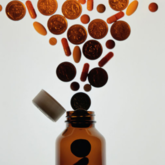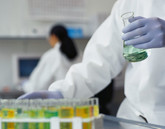Reports
Disruptor partnerships grow adalimumab biosimilar market share
Despite 10 biosimilar versions of Humira (adalimumab) being available in the US market since 2023, their uptake has remained low. Humira retained 97% of its market share for adalimumab through to March 2024. However, now, a new form of partnership has allowed adalimumab biosimilars to increase their market share.
Top nine biological drugs by sales in 2023
The global biologicals market surged to an impressive US$419.07 billion in 2023. Blood and blood products led the market, commanding a dominant 66% share. Oncology stood out as the leading application segment, accounting for 36% of the market. North America held the largest revenue share, at 46%, while the Asia-Pacific region emerged as a rising star, poised to be the fastest-growing region over the next decade.
New findings of semaglutide in managing hidradenitis suppurativa
At the recent EADV Congress (25 to 28 September 2024), a first-of-its-kind study demonstrated that semaglutide can significantly improve outcomes for obese patients with hidradenitis suppurativa (HS), a common and chronic skin condition. [1].
Challenges and solutions in addressing the development void for oncology biosimilars
Europe's oncology sector remains dominant, bolstered by numerous biosimilars. Despite current growth, a decline in biosimilar development from 2025 threatens future access, requiring strategic interventions to sustain progress.
Role of biologicals and biosimilars in cancer treatment amidst rising cases
At the 20th Biosimilars Medicines Conference held in April 2024, Aurelio Arias, Director of EMEA Thought Leadership at IQVIA, explored the risks and challenges associated with accessing cancer treatments involving biologicals and biosimilars [1].
FDA plans to standardize biosimilar approvals and boost access in FY 2025
At the 20th Biosimilars Medicines Conference held in April 2024, Dr M Stacey Ricci* from the US Food and Drug Administration (FDA) presented information on the current status of FDA approvals of biosimilars, discussed the role of interchangeable biosimilars and their future development, and outlined the FY 25 legislative goals, including the elimination of the statutory distinction between the approval standards for biosimilar and interchangeable biosimilar products [1].
Decoding US IRA and Medicare drug price negotiations
The Alliance for Safe Biologic Medicines (ASBM) in collaboration with the Generics and Biosimilars Initiative (GaBI) held a webinar on the 2022 Inflation Reduction Act (IRA), on 26 July 2023. An outline of this webinar, ‘Medicare drug price negotiations: impact on healthcare development and patient access to medicines’, was published in GaBI Journal [1].
Highlights of EMA approvals in 2023 focus on cancer medicines
In its ‘2023 Human Medicines Highlights’, the European Medicines Agency (EMA) provided a comprehensive overview of key recommendations for the approval of medicines in various therapeutic areas. Notably, the report highlighted significant advancements in cancer treatment approvals, including cancer biosimilar.
Follow-on biological/ biosimilar approvals in Latin America by therapeutic class
According to a review by Machado et al., across seven Latin American nations, biosimilar approval patterns diverge from Canada, Europe, and the US. Anti-anaemic and diabetes treatments are notably lacking approvals, while Brazil emerges as a leader in biosimilar authorization [1].
Follow-on biological/ biosimilar approvals landscape in Latin America
Machado et al. analyse the clarity and regulatory guidelines associated with the approval process for biosimilars. Additionally, they examine the quantity of biosimilars that have received approval from 13 different medicines regulatory authorities in their review [1].












